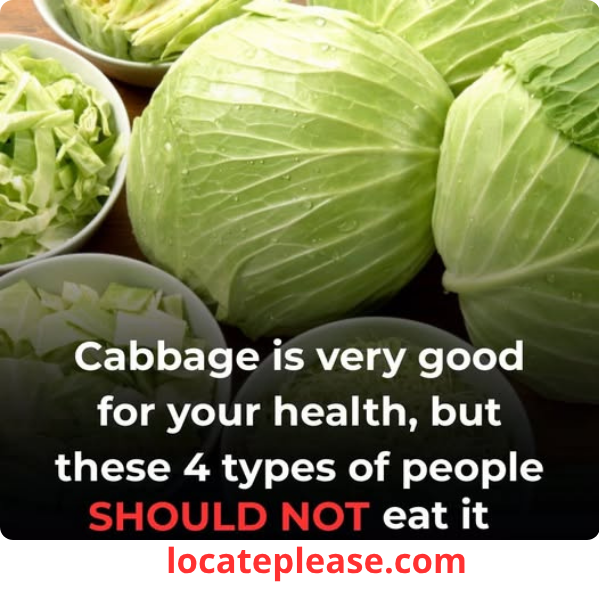Cabbage is a nutrient-dense vegetable, packed with vitamins, minerals, and antioxidants. It’s a staple in many cuisines and is often praised for its health benefits, including supporting digestion, boosting immunity, and promoting heart health. However, despite its many advantages, cabbage isn’t suitable for everyone. Certain individuals may need to limit or avoid this cruciferous vegetable due to specific health conditions or sensitivities. Here are four types of people who should think twice before adding cabbage to their plate .
1. Individuals with Thyroid Issues (Hypothyroidism)
Cabbage belongs to the cruciferous vegetable family, which contains compounds called goitrogens . These substances can interfere with thyroid function by blocking the uptake of iodine, a mineral essential for producing thyroid hormones. For individuals with hypothyroidism or an underactive thyroid, consuming large amounts of raw cabbage may exacerbate their condition.
What to Do:
If you have thyroid issues but still want to enjoy cabbage, consider cooking it. Cooking reduces the goitrogenic compounds, making it safer to consume in moderation. Additionally, ensure your diet includes adequate iodine, either through food sources like iodized salt or supplements (consult your doctor first).
2. People with Digestive Sensitivities or IBS
Cabbage is high in fiber, which is beneficial for most people as it supports healthy digestion and prevents constipation. However, for individuals with irritable bowel syndrome (IBS) or other digestive disorders, the fiber and fermentable carbohydrates in cabbage (specifically FODMAPs) can cause bloating, gas, abdominal pain, and diarrhea.
What to Do:
If you have IBS or a sensitive digestive system, try limiting your intake of cabbage or opt for smaller portions of cooked cabbage instead of raw. Low-FODMAP alternatives like zucchini or carrots may be better suited for your needs.
3. Those on Blood-Thinning Medications
Cabbage is rich in vitamin K , a nutrient that plays a critical role in blood clotting. While this is beneficial for most people, individuals taking blood-thinning medications like warfarin need to be cautious about their vitamin K intake. Consuming large amounts of vitamin K-rich foods like cabbage can interfere with the effectiveness of these medications, potentially increasing the risk of clotting or bleeding.
What to Do:
If you’re on blood thinners, maintain a consistent intake of vitamin K-rich foods rather than drastically increasing or decreasing your consumption. Work with your healthcare provider or a dietitian to create a balanced meal plan.
4. People Prone to Kidney Stones
Cabbage contains oxalates , naturally occurring compounds that can bind with calcium in the body to form kidney stones. For individuals prone to developing kidney stones, eating high-oxalate foods like cabbage may increase the risk of stone formation. This is particularly relevant for those with a history of calcium oxalate stones, the most common type of kidney stone.
What to Do:
If you’re prone to kidney stones, consider reducing your intake of high-oxalate foods like cabbage. Drinking plenty of water and consuming low-oxalate vegetables such as broccoli or cauliflower can help minimize the risk.
While cabbage is undeniably nutritious and offers numerous health benefits, it’s not a one-size-fits-all food. Individuals with thyroid issues , digestive sensitivities , blood-thinning medication needs , or a history of kidney stones should approach cabbage with caution. Moderation, preparation methods (like cooking), and personalized dietary adjustments can help mitigate potential risks.
As always, consult your healthcare provider or a registered dietitian if you’re unsure whether cabbage is right for you. By understanding how your body responds to certain foods, you can make informed choices that support your overall health and well-being. After all, balance is key when it comes to nutrition!






